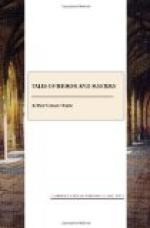I have said that against the wall—on the right-hand side of the doorway (the right-hand side as we looked at it, but the left as one entered)—there stood a large mummy-case. To our unutterable amazement it was slowly opening. Gradually, gradually the lid was swinging back, and the black slit which marked the opening was becoming wider and wider. So gently and carefully was it done that the movement was almost imperceptible. Then, as we breathlessly watched it, a white thin hand appeared at the opening, pushing back the painted lid, then another hand, and finally a face—a face which was familiar to us both, that of Professor Andreas. Stealthily he slunk out of the mummy-case, like a fox stealing from its burrow, his head turning incessantly to left and to right, stepping, then pausing, then stepping again, the very image of craft and of caution. Once some sound in the street struck him motionless, and he stood listening, with his ear turned, ready to dart back to the shelter behind him. Then he crept onwards again upon tiptoe, very, very softly and slowly, until he had reached the case in the centre of the room. There he took a bunch of keys from his pocket, unlocked the case, took out the Jewish breastplate, and, laying it upon the glass in front of him, began to work upon it with some sort of small, glistening tool. He was so directly underneath us that his bent head covered his work, but we could guess from the movement of his hand that he was engaged in finishing the strange disfigurement which he had begun.
I could realize from the heavy breathing of my companion, and the twitchings of the hand which still clutched my wrist, the furious indignation which filled his heart as he saw this vandalism in the quarter of all others where he could least have expected it. He, the very man who a fortnight before had reverently bent over this unique relic, and who had impressed its antiquity and its sanctity upon us, was now engaged in this outrageous profanation. It was impossible, unthinkable—and yet there, in the white glare of the electric light beneath us, was that dark figure with the bent grey head, and the twitching elbow. What inhuman hypocrisy, what hateful depth of malice against his successor must underlie these sinister nocturnal labours. It was painful to think of and dreadful to watch. Even I, who had none of the acute feelings of a virtuoso, could not bear to look on and see this deliberate mutilation of so ancient a relic. It was a relief to me when my companion tugged at my sleeve as a signal that I was to follow him as he softly crept out of the room. It was not until we were within his own quarters that he opened his lips, and then I saw by his agitated face how deep was his consternation.
“The abominable Goth!” he cried. “Could you have believed it?”
“It is amazing.”
“He is a villain or a lunatic—one or the other. We shall very soon see which. Come with me, Jackson, and we shall get to the bottom of this black business.”




